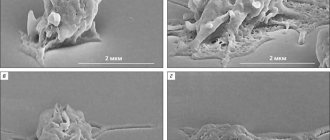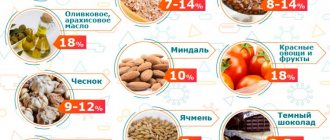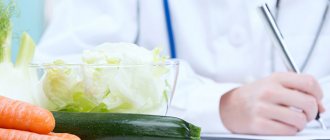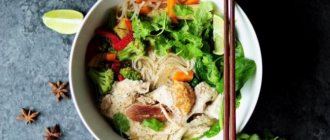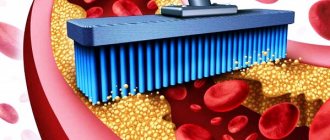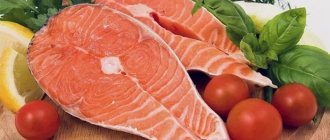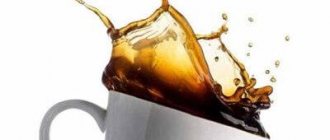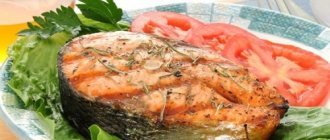What should be meant by the term “thick blood”? This is a high concentration of formed elements (red blood cells, leukocytes, platelets), combined with excess sugar, cholesterol, and lipids.
All this together provokes an increase in the activity of cell membranes, which is why the same red blood cells and platelets literally “stick together,” thereby forming blood clots. And the main reason for too “thick blood” is unhealthy food in the diet.
What products help thin the blood in the human body and prevent the formation of blood clots? Using information from official medical sources, we have compiled a list of 24 most suitable foods for this purpose, and also formulated general nutritional rules. At the end of the article we will talk about foods that, on the contrary, thicken the blood.
Why are blood thinners needed?
Thick blood leads to many health problems. First of all, the likelihood of blood clots forming in the vessels increases. They disrupt the normal blood circulation process in the body and can also clog the pulmonary and cardiac arteries and veins, posing a threat to life. To prevent the formation of blood clots, doctors prescribe anticoagulant drugs to their patients.
If you take anticoagulants for a long time, the risk of developing side effects increases, in particular, the mucous membranes of the stomach and intestines are affected, the quality of the blood is disrupted, and the threat of developing a stomach ulcer increases.
If the doctor considers it possible to stop taking anticoagulants and switch to a menu that thins the blood, then this recommendation should be followed. It is better to completely replace medications with food to thin the blood, but only on condition that this does not contradict the doctor’s prescriptions.
Rose hip
Rosehip will relieve vitamin C deficiency (Photo: pixabay.com)
The undisputed leader among berries in terms of vitamin C content. Rosehip is cheap and available in any pharmacy, and if you collected and stored this berry in the fall, you can be sure that you have provided yourself with the best source of valuable ascorbic acid. Ascorbic acid strengthens the walls of blood vessels, reduces their fragility, and protects against the appearance of blood clots and atherosclerotic plaques.
Rose hips are especially useful because, along with vitamin C, they contain vitamin PP. This pair together heals blood vessels and significantly reduces the risk of internal hemorrhages. Rose hips also contain flavonoids, which promote the production of collagen, which forms the inner lining of blood vessels.
Indications for eating blood thinning products
Diseases of the cardiovascular system are the leading causes of death among the population around the world. Thick blood often becomes a trigger that contributes to the development of these pathologies.
The likelihood of blood clots increases if a person has the following diseases:
- IBS.
- Thrombophlebitis of chronic and acute course.
- Phlebothrombosis.
- Phlebeurysm.
- Venous insufficiency.
- Previous pulmonary embolism.
- Atherosclerotic changes in blood vessels.
- Taking hormonal medications to prevent unwanted pregnancy.
- High blood pressure.
- Impaired blood microcirculation.
- Metabolic disorders accompanied by obesity and the development of diabetes mellitus.
- High levels of platelets and red blood cells in the blood.
To reduce the risk of blood clots, it is necessary to take preventive measures that should be aimed at preventing excessive blood thickness.
Olive oil
Olive oil
Consuming olive oil at least once a week reduces platelet activity, thanks to the antioxidants contained in the oil. The study found that people who consumed extra virgin olive oil, which is high in phenolics, had lower levels of blood clot-promoting substances. Just don’t heat-treat olive oil, as it loses its beneficial properties. Add it to salads, sauces, dip bread in it.
Why does the blood become thick?
Prolonged dehydration of the body will negatively affect the thickness of the blood. Dehydration is a consequence of nutritional disorders, chronic vitamin deficiency, insufficient fluid intake, bad habits, stress and diseases of the digestive system.
Drinking alcohol causes severe dehydration of the body, as well as poisoning by the breakdown products of ethyl alcohol. The blood becomes thicker, which is the basis for the development of diseases such as heart attack and stroke. Smoking also contributes to pathological changes occurring in blood vessels, increasing the risk of developing atherosclerosis.
Eating low-quality and unhealthy foods, as well as daily stress, contribute to blood thickening and increase the risk of blood clots. Enzyme deficiency aggravates disturbances in digestive processes and leads to an increase in blood viscosity.
Description of the drug Tiklpid
Taking Triclid can reduce the aggregation of blood platelets and significantly reduce the viscosity of biological fluid. Violation of the prescribed treatment regimen and overdose can lead to the following adverse reactions:
- bleeding;
- lack of platelets necessary for natural blockage of damaged areas of arteries, vessels and tissues;
- decreased levels of white blood cells;
- abdominal pain;
- diarrhea.
In case of severe blood thickening, the drug is prescribed for a long course, and the patient’s condition is regularly monitored. When the rheology of the main biological fluid is restored, the drug can be discontinued. However, stopping the medication does not replace regular blood quality testing.
Risk factors leading to increased blood viscosity
Many medications cause the blood to become thick and begin to flow more slowly through the vessels. The more sugar a person consumes, the higher the risk of blood clots, as this negatively affects blood viscosity. Other risk factors include hereditary diseases of the hematopoietic system, pathologies of the liver and pancreas.
The thicker the blood, the worse a person feels. He gets tired faster, suffers from daytime sleepiness, and at the same time his memory and attention deteriorate. If you notice similar symptoms, you should not postpone your visit to the doctor. Otherwise, you can wait for the development of such serious health problems as: heart attack, stroke, pulmonary embolism, hypertensive crisis, etc.
Antiplatelet agents
The main indications for prescribing antiplatelet agents are:
- Cardiac lesions that have led to a lack of blood circulation in the myocardium or completely deprived it of blood flow.
- Ischemic heart lesions, especially those accompanied by tissue necrosis.
- Arrhythmia.
- Tachycardia.
- Prevention of thrombosis in patients who have had a stroke.
- Heart surgery or interventions to restore the circulatory system (stenting).
- Arterial damage.
The cost of such medicines is slightly higher than those containing acetylsalicylic acid. As a rule, such medications are taken in a course, which ensures high rheological properties of the blood constantly.
Foods that thin the blood
Eating blood thinning foods cannot be a complete alternative to taking medications prescribed by a doctor. However, provided that a person does not suffer from serious illnesses, but is only concerned about his own health, he should pay attention to blood thinning products. This is especially true for people who have a hereditary predisposition to problems with the heart and blood vessels.
| Product group | The product's name | Mechanism of action |
| Vegetables | Canned and fresh tomatoes. Cabbage, regardless of its variety. Beet. Bell pepper. | Regular inclusion of these vegetables in the menu can improve the quality of the blood, will help thin it and resist the formation of blood clots. |
| Fruits | Pomegranates (they should be eaten with caution, as they help increase hemoglobin levels). Grapefruit, lemon, orange. Any apples. Peaches and apricots. Nectarines. | The improvement in the chemical composition of the blood occurs due to the fact that fruits contain many vitamins and acids. |
| Juices | Any freshly pressed juices. They can be prepared based on fruits, berries or vegetables. | The juice must be fresh, not prepared in factory conditions. Juices from packages purchased in a store do not contain the same range of useful substances that freshly squeezed drinks will contain. |
| Berries | Blueberries, raspberries, strawberries, blackberries, currants, cranberries. | Eating fresh berries thins the blood. If you use frozen raw materials or jam for this purpose, you will not be able to achieve the desired effect. Chokeberry will thicken the blood. |
| Bee products | Honey and propolis | They have a positive effect on the quality of blood, help increase the elasticity and strength of the vascular wall. |
| Vegetable oils | Olive oil, linseed oil, sunflower seed oil, sea buckthorn oil. | All vegetable oils help fight atherosclerosis, as they reduce cholesterol levels in the blood. The exception is corn oil. |
| Seasonings and spices | Garlic, ginger, cinnamon, horseradish, hot pepper pods, apple cider vinegar. | Eating these foods helps restore the integrity of damaged red blood cells and enhances the flow of blood in the body. |
| Beverages | Plain water, mineral water with magnesium, green tea, rooibos, hibiscus, chicory, herbal infusions. | In order for your blood to have normal viscosity, you must drink enough water. If fluid enters the body in small volumes, the blood will be thick. It is worth taking into account that drinks such as coffee, black tea and industrial juices are not able to normalize the water balance in the body. Therefore, you should not count on them as assistants in the fight against high blood viscosity. |
Sour fruits and berries, as well as juice prepared from them, help thin the blood. An important condition for achieving the desired effect is preparing drinks before direct consumption. Store-bought juices are not used to thin the blood, as they contain a lot of sugar and chemical components. People suffering from stomach ulcers, gastritis and other lesions of the digestive system should not drink juice.
The table shows only the main groups of products that are aimed at thinning the blood. In fact, their list is much more extensive. However, it is the listed product set that allows you to achieve maximum effect.
Preparations without acetylsalicylic acid
Patients over 18 years of age who do not have problems with the gastrointestinal tract are safely prescribed medications containing aspirin. Especially if the duration of use does not exceed 5-7 days. In other cases, it is recommended to avoid consuming large doses of acetylsalicylic acid, especially in older patients.
The list of antiplatelet agents that do not contain aspirin includes:
- Curantil with the active ingredient dipyridamole.
- Ticlid, whose action is based on ticlodipine.
- Plavix, blood thinners thanks to cropidogrel.
- Brilint, which is based on the active ingredient ticagrelor.
- Efficient, working thanks to prasugrel included in the composition
- Pletax with the active ingredient cilostazol.
- Trental, whose action is due to pentoxifylline.
A wide selection of drugs allows a competent doctor to select an individual course of therapy for each patient, based on possible side effects and the presence of chronic diseases in the patient.
What can't you eat?
If you have diseases associated with the heart and blood vessels, as well as increased blood viscosity, you should avoid eating the following foods:
- Bread and any products based on white flour. This is valid for baked goods, cookies, biscuits, baked goods, etc.
- All sweet products: candies, chocolate, sugar, jam, caramel.
- All products that are sources of animal fats: butter, margarine, dairy products, hard cheeses.
- Products that have undergone a smoking or preservation process.
- Fatty meat and sausage.
- Starchy foods: potatoes, bananas, etc.
- Walnuts.
- Alcohol. The exception is dry red wine.
You should not drink strong tea and coffee in large quantities, as they help remove fluid from the body and thicken the blood. The same applies to sweet carbonated drinks. You should also not get carried away with the consumption of greens, in particular parsley, dill and spinach.
Sea buckthorn
The berry is rich in rare natural substances - sterols (Photo: pixabay.com) An
amazingly healthy berry containing a huge dose of vitamin C. Ascorbic acid is recognized as a natural blood thinner, so if there is a violation of its viscosity, consuming sea buckthorn will be the right decision.
The berry contains sterols. These are substances with a powerful anti-sclerotic effect. They cleanse blood vessels of cholesterol deposits, reduce the risk of coronary heart disease, restore vascular elasticity and promote the production of blood cells.
What can you eat during pregnancy
During pregnancy, active hormonal changes occur in the female body, which can become an impetus for the formation of blood clots. Blood viscosity in pregnant women is often increased. Therefore, such problems as varicose veins, thrombophlebitis, thrombosis, etc. are relevant for them.
Even those diseases that occur latently in a woman can worsen during pregnancy, which is associated with a deterioration of immunity. This is especially true for cardiovascular pathologies.
The legs suffer from thrombophlebitis and varicose veins first of all. After all, the load on them increases incredibly. If before pregnancy a woman had prerequisites for varicose veins, then after pregnancy the disease can develop very quickly. Sometimes such serious complications as thrombophlebitis occur.
Taking most medications during pregnancy is prohibited, so doctors recommend that women follow a menu aimed at thinning the blood. The basis of the diet should be vegetables, fruits and vegetable oils. Be sure to drink enough liquid, but only in the volumes recommended by doctors. Otherwise, the load on the kidneys will increase, which can be no less dangerous than blood thickening.
A pineapple
Pineapple baked with pepper, recipe here
The tropical fruit contains a special protein-breaking enzyme, bromelain, which is considered an effective remedy for cardiovascular diseases and high blood pressure. Research shows that bromelain can thin the blood, break up blood clots, and reduce their formation—include pineapple in your diet if you want to prevent thickening of your hair. Bromelain also has anti-inflammatory properties.
Fruits and vegetables to thin the blood
The menu should include fresh vegetables and fruits. Preference should be given to apples, cabbage, cucumbers, and tomatoes. It is best to eat meat less often, and fish more often. During pregnancy, you should avoid ginger and bay leaves, as these products can cause premature placental abruption and even lead to miscarriage.
All homeopathic medicines are prohibited during pregnancy.
As for greens, you need them, but in small quantities. You should eat often, but in small portions. Vegetable salads must be seasoned with vegetable oils. Pickles, fish, and vegetables help make the menu more varied. If a pregnant woman has any questions about menu planning, she should ask them either her doctor or a professional nutritionist.
All products that affect the quality of the blood have an effect on other organs, so they need to be selected correctly. It is important to remember the compatibility of various components of dishes, their compatibility.
Garlic
Garlic
Garlic has natural antibacterial and antimicrobial properties, as well as anticoagulant activity and reduces the formation of blood clots. The best way to reap the benefits of garlic is to crush the cloves with the flat of a knife to “release” the beneficial compounds, then eat the cloves raw or quickly roast them in the oven.
Sources
- Anticoagulants: the place of new drugs in clinical practice // Remedium. - 2014. - No. 3. - P. 42-44.
- Arkadieva G.V. Prevention and treatment of thrombosis and thromboembolism with indirect-acting anticoagulants // Russian Journal of Cardiology. - 2003. - No. 6. - P. 73-80.
- Bokarev I.N. Anticoagulants today // Clinical medicine. - 2016. - No. 94 (1). — P. 5-9.
- Vavilova T.V. Anticoagulants in clinical practice // Medical Council. - 2015. - No. 12. - P. 44-47.
- Gendlin G.E., Borisov S.N. The ideal anticoagulant? // Atmosphere. Cardiology news. — 2010. — No. 2–3. — P. 2-6.
- Emelyanov D.N., Sergeev V.S. Anticoagulants in cardiological practice // Medicinal Bulletin. - 2013. - No. 3 (51). Volume 7. - pp. 20-27.
- Kasimova A.R., Filippova A.F., Kolbin A.S. Hepatotoxicity of new oral anticoagulants // Rational Pharmacotherapy in Cardiology. - 2021. - No. 14 (4). — P. 621-628.
- Erlikh A.D. Anticoagulants and antiplatelet agents in the era of COVID-19 // Atherothrombosis. — 2021 — No. 11. — pp. 58–66.


